Strat-O-Matic Fanatic Page!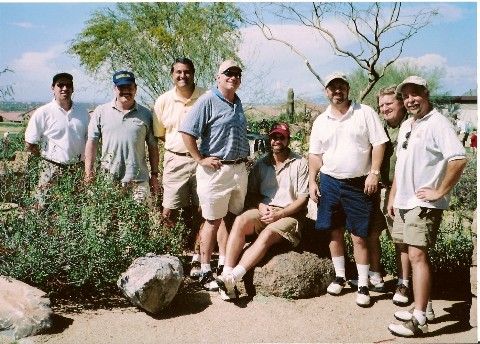
(written by Ken Herman)
This is the Paradise Canyon League entry into the Ultimate Strat-O-Matic Fanatic contest. We decided to enter this contest as a league because we are a team and view SOM as a reflection of our long standing and deeply felt friendship.
Over 40 years ago we began developing life-long friendships and SOM became a way of playing with each other through a common love for sports. It has been the excuse we have used to get together, share our individual life experiences, and temporarily escape from our normal lives to collectively engage in fun competition with each other. In the early years we developed informal leagues that lasted about as long as our attention span and our ability to emotionally endure a losing streak, which was a few games in an afternoon. As soon as one manager started losing a few games, the league was usually disbanded in favor of a new league with rejuvenated excitement. We enjoyed the process of playing together more than the winning or losing. This has remained true today.
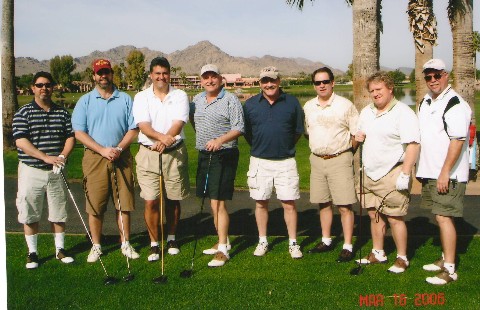 As we grew up, so did our ability to sustain mental effort over time and endure losing streaks. We began playing more games per league and eventually had the awareness that SOM was more than a game for us, it was woven into the fabric of our lives and was going to be part of our lives for the long term. Bob and I (Ken) designed the foundation of the PCL in 1987 and presented the ideas to our life-long SOM friends who immediately loved the concept of an on-going league that involved scouting, player management, retention of players from year to year, and playing an 80 game season. We began holding our annual drafts in Phoenix, AZ, where we could combine SOM with MLB Spring Training. Since 1988, we have been gathering in the desert (mostly Phoenix, but sometimes Las Vegas) every March to celebrate our long standing friendships, play some golf (above), and conduct our annual draft/auction.
As we grew up, so did our ability to sustain mental effort over time and endure losing streaks. We began playing more games per league and eventually had the awareness that SOM was more than a game for us, it was woven into the fabric of our lives and was going to be part of our lives for the long term. Bob and I (Ken) designed the foundation of the PCL in 1987 and presented the ideas to our life-long SOM friends who immediately loved the concept of an on-going league that involved scouting, player management, retention of players from year to year, and playing an 80 game season. We began holding our annual drafts in Phoenix, AZ, where we could combine SOM with MLB Spring Training. Since 1988, we have been gathering in the desert (mostly Phoenix, but sometimes Las Vegas) every March to celebrate our long standing friendships, play some golf (above), and conduct our annual draft/auction.
The 1960's: Roots.
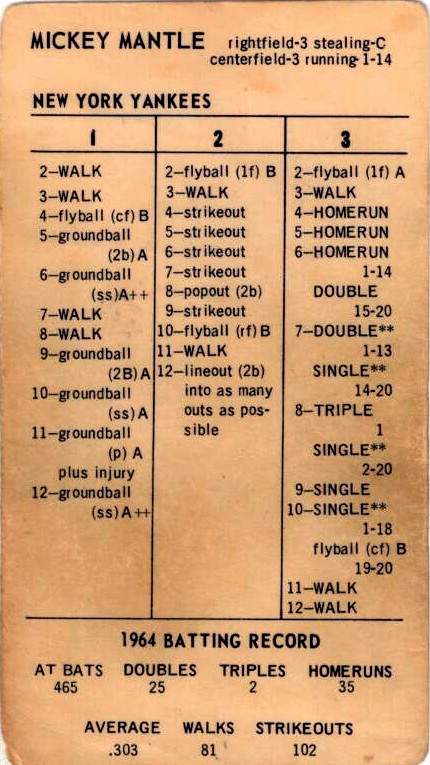 My introduction to SOM began in 1965 a when a friend's older brother, Jimmy, who lived across the street from me was given the 1964 card set as a present. He shared the game with his younger brother, Mark, and I. While Jimmy lost interest in the game, Mark and I played SOM baseball together for most of the late 1960's. I inherited the 1964 card set and still have the set today. The cards have been used in thousands of games and have yellowed some over time (see the scan of the Mickey Mantle card on the left).
My introduction to SOM began in 1965 a when a friend's older brother, Jimmy, who lived across the street from me was given the 1964 card set as a present. He shared the game with his younger brother, Mark, and I. While Jimmy lost interest in the game, Mark and I played SOM baseball together for most of the late 1960's. I inherited the 1964 card set and still have the set today. The cards have been used in thousands of games and have yellowed some over time (see the scan of the Mickey Mantle card on the left).
We quickly learned that SOM was producing cards every year and Mark and I began alternating buying cards every year to share with each other (see the Bob Gibson scan on the right). We were in elementary and intermediate school at the time so it took all our allowance and some begging with our parents to buy a new card set.
BTW: The name of our elementary school? Paradise Canyon Elementary School (PCY), which we would later adapt as our league name (PCL).
Our friendships go back to little league. Below and to the right is when I met Jim. Jim's 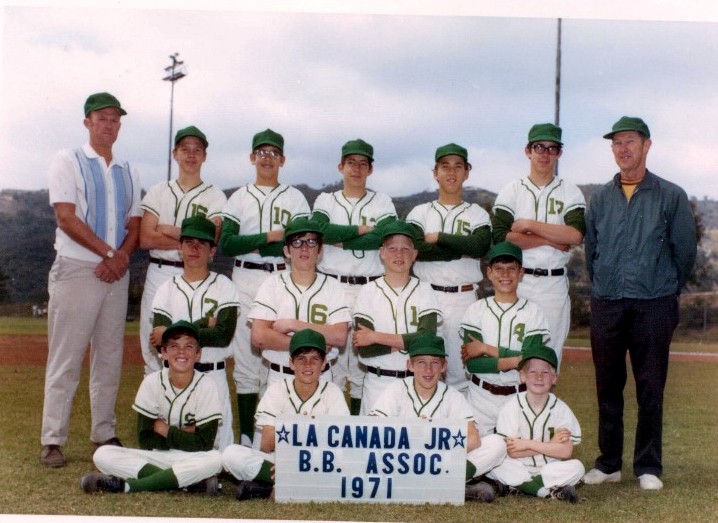 father was one of our coaches and this team won the league!
father was one of our coaches and this team won the league!
The 1970's: Expansion and solidifying the friendship bonds.
In the late 1960's Mark lost interest in SOM and I began introducing SOM to my younger brothers (Carl and Eric) and a number of new peers I met at school. Carl was a Red sox fan and loved playing with Sox, especially his favorite player Carl Yastrzemski. Eric managed some great Oakland A's teams, as well as, the Brewers and Twins during the early to mid-1970's. Their stories are presented in their own words below. The picture on the upper right is me tearing into a new strat-o card set in 1973! The best day of the year (don't you love that couch?)! Carl, Eric, and I are pictured in the lower right.
One of the new friends I met at Foothill Intermediate 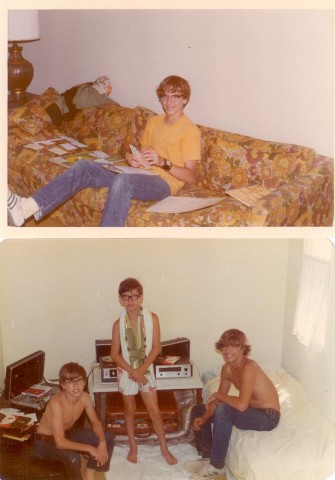 School was Bob, who was playing a spinner baseball game at the time that was loosely based on MLB statistics. I think it's fair to say that Bob was blown away by the statistical advantages of SOM and quickly dumped the spinner
School was Bob, who was playing a spinner baseball game at the time that was loosely based on MLB statistics. I think it's fair to say that Bob was blown away by the statistical advantages of SOM and quickly dumped the spinner 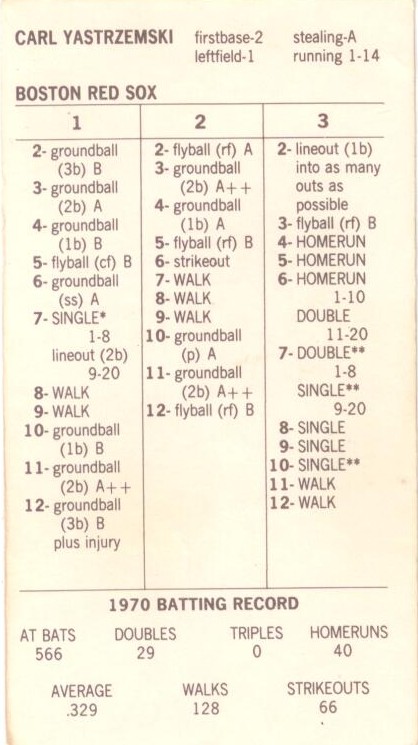 baseball game for SOM. Bob managed the Houston Astros and the Kansas City Royals in our early leagues.
baseball game for SOM. Bob managed the Houston Astros and the Kansas City Royals in our early leagues.
Another PCL league member and my valued friend Jim. Jim and I were actually teammates on a championship little league baseball team while we were in elementary school. I later introduced SOM to Jim and he loved the game. As I recall, Jim took the St. Louis Cardinals in our early leagues. I think it was Jim who helped slowly expand our league in high school to include Bob B. (Pittsburgh Pirates), Mike B. (who also managed the Kansas City Royals), and Matt. We spent many summers playing SOM, over-the-line baseball and basketball at PCY, and "nerf baseball" in our backyards and driveways. In fact, a recent Facebook exchange with Mike found him living in Kansas City. He stated that he fell in love with KC through playing SOM and always wanted to live there. He made his SOM wish come true.
In 1971 SOM went from the one-sided basic game to a two-sided advanced version, which really took SOM to a different level of complexity (see the lower right example of two 1978 cards)! 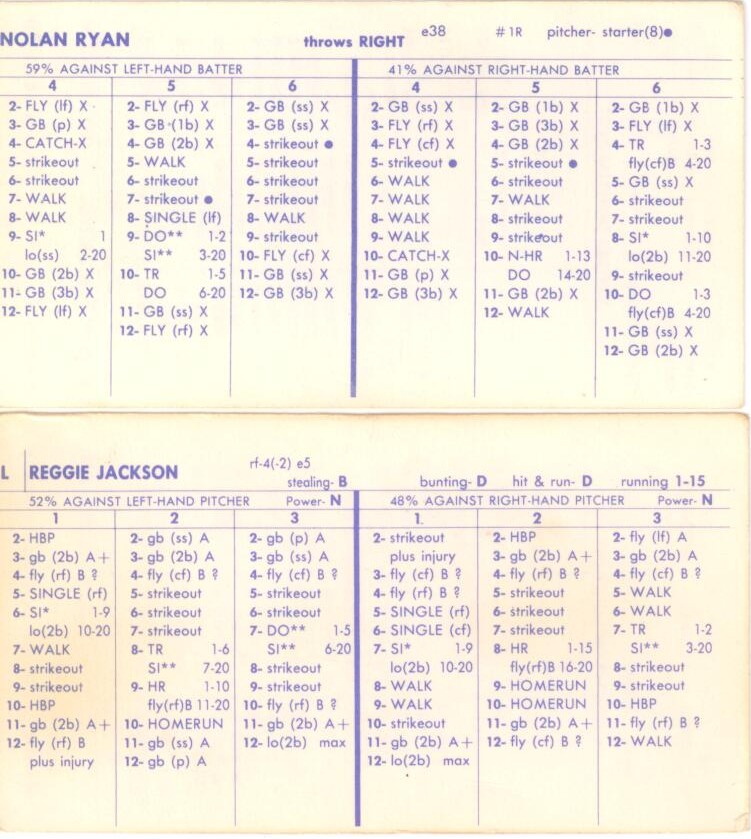 Now we could really understand why some managers bring in a lefty reliever to face a tough lefty batter. For example, see the difference between lefty and righty pitchers on the Reggie Jackson's 1978 card on the right. It's pretty easy to comprehend why a manager would bring in a lefty pitcher to face Jackson.
Now we could really understand why some managers bring in a lefty reliever to face a tough lefty batter. For example, see the difference between lefty and righty pitchers on the Reggie Jackson's 1978 card on the right. It's pretty easy to comprehend why a manager would bring in a lefty pitcher to face Jackson.
I met Steve in Mr. Logan's 10th grade PE class at LCHS. Steve, Bob, and I hung out every day in HS and have remained close friends today. Steve took the Atlanta Braves in our early leagues. I recall that he won one or more leagues with the Braves. They were nearly impossible to beat because they had four guys with mega-power: Hank Aaron, Darrell Evans, Davey Johnson, and Dusty Baker. Ralph Garr also had some pretty good power years and the pitching was above average too!
In the early SOM leagues, every owner selected a MLB team or two and we supplemented the weaker teams with draft choices. Weaker teams were awarded a draft pick or two ranging in quality from "AA" to "B" (similar to the elementary stealing ratings). Sometimes these picks came from the Hall of Fame set, but most of the time they came from a group of "free agents" comprised of players from unselected teams. Our intent was to provide the weaker teams with enough picks to compete with the better teams.
We began keeping serious individual and team stats from our leagues and would post league leaders. We all became lighting fast at adding a column of numbers, which really boosted our underlying math fluency skills. Batting averages and pitching ERA's were calculated using a slide rule! Our love for SOM fueled the development of a solid understanding of statistics for all of us. That stated, I don't think any one of us wasn't thrilled with SOM came out with a computer version of the game that kept stats for us!
Bob's cousin, Mike, would often come to La Canada to visit his extended family while growing up. Bob introduced Mike to SOM and Mike developed an interest for the game. Mike's favorite team was the San Francisco Giants and he would play with them whenever he could. Mike would later become one of the founding members of the PCL.
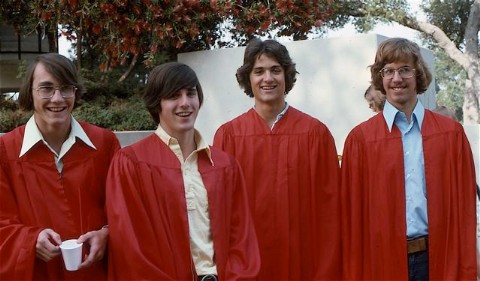 The next few years saw us graduate from La Canada High School and head off to college. The picture of the left is at our high school graduation and, from left to right, is Steve, Mike (a non-Strat-o friend), Bob, and myself. We had no idea what the future held for us, but we mostly focused our efforts in other life domains (such as girlfriends, partying, and academics). In any event, we scattered to different parts of the state for college, but we took SOM with us. We discovered, to our surprise, a number other college students who not only knew about SOM, but played it. Thus, many of us continued ordering SOM cards and playing in SOM leagues in our college dorms.
The next few years saw us graduate from La Canada High School and head off to college. The picture of the left is at our high school graduation and, from left to right, is Steve, Mike (a non-Strat-o friend), Bob, and myself. We had no idea what the future held for us, but we mostly focused our efforts in other life domains (such as girlfriends, partying, and academics). In any event, we scattered to different parts of the state for college, but we took SOM with us. We discovered, to our surprise, a number other college students who not only knew about SOM, but played it. Thus, many of us continued ordering SOM cards and playing in SOM leagues in our college dorms.
We began meeting new friends during this period. Jim went to the University of Redlands for college and met Gordon, who has been our Operations Director since he joined the PCL. Jim and Gordon played SOM at Redlands together and joined the PCL after college.
The 1980's: College and the challenges of young adulthood.
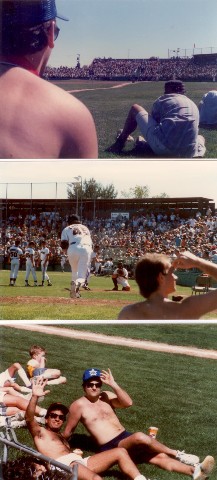 The early 1980's found most of us either in college, graduate school, or beginning our own families. We were now scattering to different regions in the country, spanning some 6,000 miles apart from each other. Jim moved to Hawaii for a number of years, Steve went off to graduate school in Chicago before migrating to NJ. Bob was the most mobile of all of us. He attended the University of San Diego for law school, moved to CT where he met Pat who was a fellow associate in his first law firm, then made temporary stops in Kansas and Houston before settling in Seattle.
The early 1980's found most of us either in college, graduate school, or beginning our own families. We were now scattering to different regions in the country, spanning some 6,000 miles apart from each other. Jim moved to Hawaii for a number of years, Steve went off to graduate school in Chicago before migrating to NJ. Bob was the most mobile of all of us. He attended the University of San Diego for law school, moved to CT where he met Pat who was a fellow associate in his first law firm, then made temporary stops in Kansas and Houston before settling in Seattle.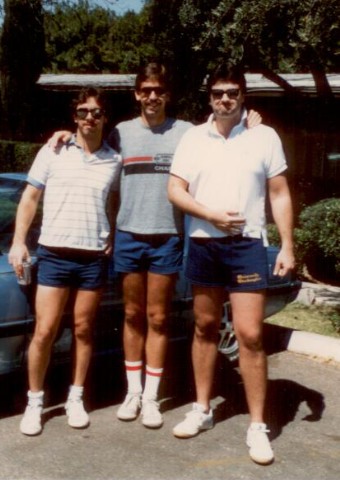 The rest of us pretty much remained in the southern California area.
The rest of us pretty much remained in the southern California area.
While Bob was at USD, he joined a group of law students who went to Phoenix every March for MLB Spring Training baseball. They invited Eric and I to join them one year (these pictures are from our original trip to Phoenix). Back in the 1980's Spring Training baseball was much more relaxed and the over flow crowd was allowed to sit on the field in foul territory!! We were a matter of feet from the bullpen! That gave us an up close and personal view of the game! There was even a bench clearing brawl in this game. Needless to say, we stayed away from it. The weather was dry and the temperature was in the low 90's. It was a perfect atmosphere for baseball. We had so much fun on this trip that evolved into our on-going PCL tradition of going to Phoenix every March to watch MLB Spring Training baseball.
The formation of the PCL
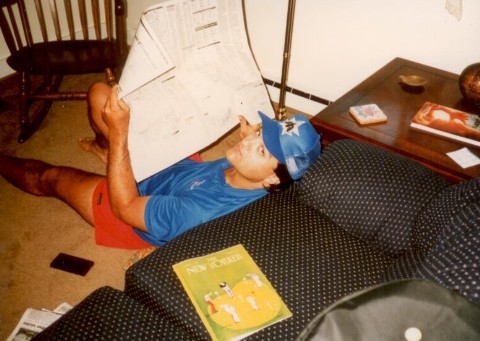 In 1987, Bob (right) and I met up on a trip to Washington, DC. This was a spontaneous gathering to catch up on life. Since we were in a hotel room together all day with nothing to do, we started talking about forming a new SOM league that retained players from year to year. That afternoon, we developed the underlying concepts that evolved into the PCL. We had both witnessed how Rotisserie baseball had taken off and discussed the idea of blending Rotisserie ideas into a SOM league. We ran these concepts by Steve and Eric and they contributed additional ideas that formed the PCL.
In 1987, Bob (right) and I met up on a trip to Washington, DC. This was a spontaneous gathering to catch up on life. Since we were in a hotel room together all day with nothing to do, we started talking about forming a new SOM league that retained players from year to year. That afternoon, we developed the underlying concepts that evolved into the PCL. We had both witnessed how Rotisserie baseball had taken off and discussed the idea of blending Rotisserie ideas into a SOM league. We ran these concepts by Steve and Eric and they contributed additional ideas that formed the PCL.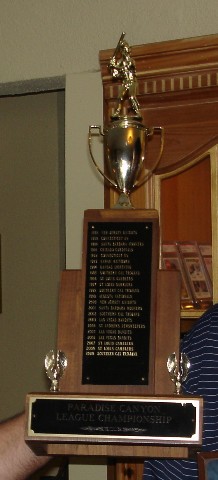
In our inaugural year (1988), all owners ranked players for one big draft. Bob took on the task of selecting players for all the teams in the league. That filled up eight rosters. Three owners had two teams each (Bob, Eric, Ken) and two owners carried one team each (Pat and Steve). Steve's New Jersey Knights had a remarkable run at the end of the season to win our first PCL World Series. The league purchased a trophy (right) for the World Series champion, which gets passed around annually. Jim joined the PCL in 1989 with Hawaii and then added Chicago in 1990. Jim's teams have generally made the playoffs and competed for the championship through the years. Gordon (lower left) came aboard in 1992 with Vegas and Augusta. He picked the nickname "Nationals" for Augusta and we were all pleasantly surprised when the MLB Washington Nationals chose the same name. The Las Vegas Bandits have been highly successful and have won four of the last eight championships.
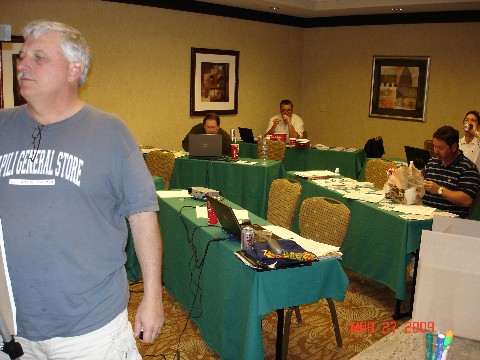 The league rules have evolved some over the years. During the early years, we held annual drafts and retained players until we cut them or they retired. We discovered that this approach did not create the competitive balance we aspired to. In 1999 we began limiting the number of years a player could be retained on a roster to four years max. About the same time, we switched from a draft to a Rotisserie type auction with a team financial cap of $275. While we continue to modify the league rules some every year, these basic rules have remained in place.
The league rules have evolved some over the years. During the early years, we held annual drafts and retained players until we cut them or they retired. We discovered that this approach did not create the competitive balance we aspired to. In 1999 we began limiting the number of years a player could be retained on a roster to four years max. About the same time, we switched from a draft to a Rotisserie type auction with a team financial cap of $275. While we continue to modify the league rules some every year, these basic rules have remained in place.
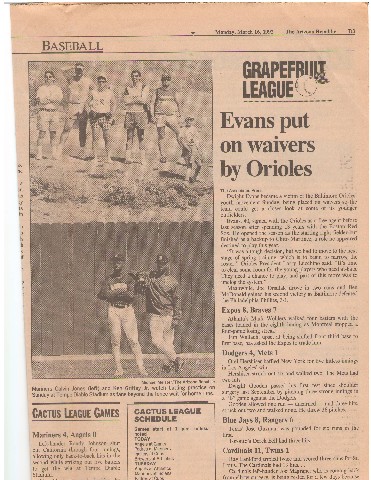 As the PCL formed, Phoenix became the traditional annual gathering point for our PCL draft (above). One year we woke up and found our mugs printed in the Arizona Republic with Junior (right)! Okay, well it wasn't exactly with Junior, but you see what I mean. On another day, we attended a Chicago Cub spring training game and hid under the stands during a rain delay. Our picture was printed in the Republic the next day.
As the PCL formed, Phoenix became the traditional annual gathering point for our PCL draft (above). One year we woke up and found our mugs printed in the Arizona Republic with Junior (right)! Okay, well it wasn't exactly with Junior, but you see what I mean. On another day, we attended a Chicago Cub spring training game and hid under the stands during a rain delay. Our picture was printed in the Republic the next day.
The Annual Convention.
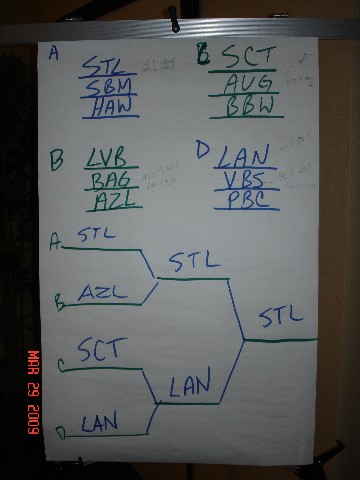 We have developed a tradition for our annual desert trip. We typically start with a couple of rounds of golf on Wednesday and Thursday followed by our annual rules meeting Thursday night. Friday is typically reserved for our auction and we auction off free agents and rookies. This is a very fun day - our version of Christmas! Saturday is reserved for the post-auction hangovers an a preseason tournament designed to allow us to try out our newly formed teams. This tradition began in 1997 and Bob typically arranges the teams for round robin style tournament (upper left).
We have developed a tradition for our annual desert trip. We typically start with a couple of rounds of golf on Wednesday and Thursday followed by our annual rules meeting Thursday night. Friday is typically reserved for our auction and we auction off free agents and rookies. This is a very fun day - our version of Christmas! Saturday is reserved for the post-auction hangovers an a preseason tournament designed to allow us to try out our newly formed teams. This tradition began in 1997 and Bob typically arranges the teams for round robin style tournament (upper left). 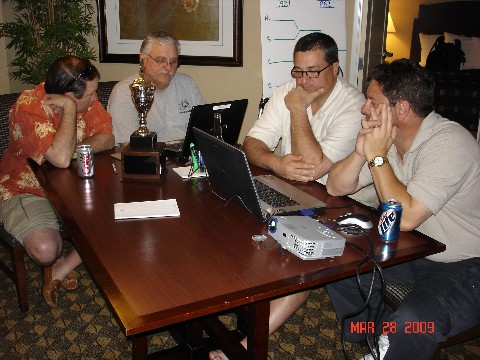
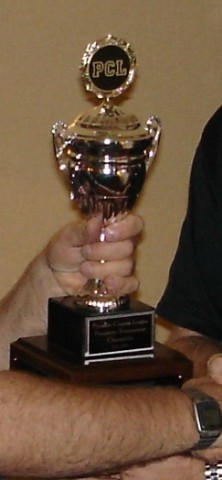 The winner gets to take home a special preseason tournament championship trophy for the year (left). As it turns out, winning the preseason tournament typically hasn't led to World Series titles, so the trophies are generally split between two league members every year.
The winner gets to take home a special preseason tournament championship trophy for the year (left). As it turns out, winning the preseason tournament typically hasn't led to World Series titles, so the trophies are generally split between two league members every year.
Passion and the roll of the dice.
Anyone who has played SOM understands that at its base level, SOM is a card and dice game. No matter how hard one scouts or how good one's team might be, you are always vulnerable to the dice rolls within any single game. There are exciting moments in any Strat league that include no-no's, clutch hits, walk-offs, etc., but all of these great moments have two sides of the story.
We have many stories in our league concerning times when managers lost their cool during a SOM game. I kicked a hole in my closet door after a particularly brutal series of dice rolls. I remember Bob B. burning his cards after a disappointing season, but perhaps the most famous reaction belonged to Mike B., who slammed his pencil through the exterior of his stat binder and through a number of individual game scoring sheets inside his binder. Mike and I counted the number of pages his pencil penetrated. It was quite impressive. While I forget the actual number, I'm sure it was a league record!
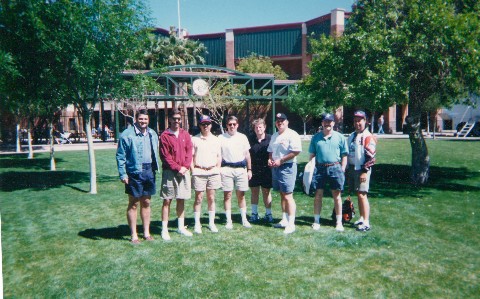 By all rights, Eric has earned the right to lose behavioral control on many occasions. But, I have yet to see him really unload. Throughout Eric's SOM career he has been haunted by a string of closers who have not been able to close out games. This trend began in the mid-1970s with "Gopher Ball" Tom Johnson of the Twins who contributed heavily to one of the greatest SOM team collapses in history. The Twins went from a playoff lock to being locked out in one tough afternoon set of games. Eric also endured a number of years with Rod "F'ing" Beck, who had a similar SOM career catastrophe for Eric. Although Eric hasn't behaviorally decompensated to my knowledge, he still cringes at the sound of these two names.
By all rights, Eric has earned the right to lose behavioral control on many occasions. But, I have yet to see him really unload. Throughout Eric's SOM career he has been haunted by a string of closers who have not been able to close out games. This trend began in the mid-1970s with "Gopher Ball" Tom Johnson of the Twins who contributed heavily to one of the greatest SOM team collapses in history. The Twins went from a playoff lock to being locked out in one tough afternoon set of games. Eric also endured a number of years with Rod "F'ing" Beck, who had a similar SOM career catastrophe for Eric. Although Eric hasn't behaviorally decompensated to my knowledge, he still cringes at the sound of these two names.
It's been tough to win PCL championships and especially hard when you enter the playoffs with the with the best record in the league during the regular season. In fact, as of 2010, the #1 seeded team in the playoffs (team with the best regular season record) has only won nine of our twenty-three championships (39%). That's a lot of upsets.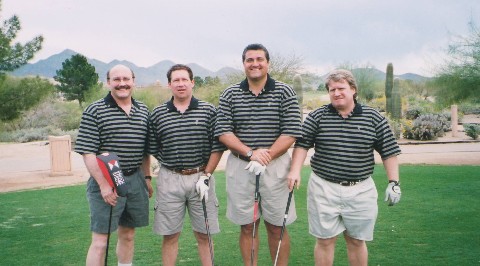
Our league members have given generously to each other over the years. Pat gave each of us league shirts (right) and Jim has engraved PCL beer glasses and shot glasses (which I use frequently). Mike has handed out special PCL golf tees and recently bought us all SOM tee shirts. Bob has funded mid-summer golf trips to his golf club in Seattle and treated us to luxury box seats for Mariner games. Steve has given away wood covers, tees, balls, and towels from our favorite college teams. Gordon and Steve have both researched great golf courses for us to hack away at during the first two days of our convention.
Personal stories regarding the impact of SOM on our lives as told be some of our league owners:
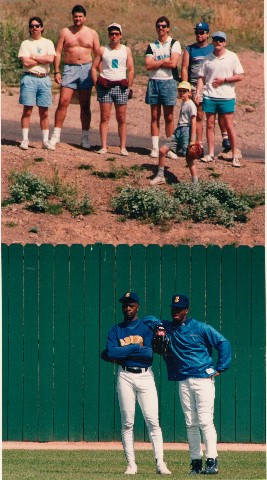 Eric's SOM story:
Eric's SOM story:
I didn't understand…my older brother Ken would disappear for hours to his friend Mark’s house to play some baseball game called Strat-O-Matic. He would come back all excited, but I was too young to play. Finally, after years of this, the summer of 1972 came and Ken taught me how to play! My team was the World Champion Oakland A’s! I fell in love with Bert Campaneris, Reggie Jackson, Vida Blue, Gene Tenace, Rollie Fingers, Sal Bando, Joe Rudi, and especially in 1973 with Billy North. Even though I finished last in our league the first year, I had the batting champ with Billy North the next year (he almost hit .400!) In the 1970’s my teams were the Oakland A’s and the Minnesota Twins, and later the Milwaukee Brewers. Throughout the ‘70’s prior to affordable calculators, my brothers and I would do our stats using slide rules, and I learned a love of numbers. Little did I know that this would lead to my profession in life! In 1980, I went off to college thinking my strato days were over, but brother Ken got together with strato fanatic Bob Oakland and started a new league…the PCL! Since 1988 am intrepid group of baseball lovers have been getting together every spring to “draft and/or auction” our teams (which we follow every morning in the box scores), and then recreate with the strato cards once they arrive (like Christmas when they come…we e-mail each other as they come with rip…rip…rip). We must have been one of the earliest Fantasy Baseball leagues! When I graduated college, I chose to become a teacher, and I truly believe that my love of stats in Strato led to my becoming a math teacher! I have been teaching for 26 years, and am now teaching AP Calculus in the Antelope Valley, where I was Awarded Teacher of the Year in my district!  I have been playing now for 38 years, and am still excited each December when I can order, and each Spring when the cards arrive. Strato has allowed my friends and I to keep in touch and see each other for nearly four decades, and I hope to continue this for the rest of our lives! We talk each spring of retiring together near a golf course and driving our wives crazy with baseball, golf, and of course, Strat-O-Matic!
I have been playing now for 38 years, and am still excited each December when I can order, and each Spring when the cards arrive. Strato has allowed my friends and I to keep in touch and see each other for nearly four decades, and I hope to continue this for the rest of our lives! We talk each spring of retiring together near a golf course and driving our wives crazy with baseball, golf, and of course, Strat-O-Matic!
Wow…
Bob's story:
I moved from Seattle to LA in my 8th grade year playing brand x spinner baseball game. The friends I met during my high school years, including original founder, Ken Herman, showed me Strategy-O-Matic and I haves not looked back for 39 years!
From learning advanced baseball strategy, as SOM migrated to the advanced game in the early 70s, to playing general manager to a 30 man roster (25 on the team and 5 minor leaguers) has given me skills which have translated into the work world as an adult and as. Prentice of three girls!
I consider the 8 fellow managers, who have been a part of our league over the vast majority of the years, brothers I never had. The annual sojourn to Phoenix (for golf, Spring training games, and our annual auction) counts as one of the best trips of the year. This from a person who takes 100 trips per year for my job!
While I have had good teams that won it all, and bad teams who stunk it up, the real value of Strat-O-Matic and the league is the ongoing camaraderie with long time friends I would have otherwise lost track of. I have other friends who go on hunting or fishing trips, and those who have the regular poker or bowling nights, but for me it is all about Strato. The play-by-mail format allows me to play games while on an airplane or in a lonely hotel room at night. I try not to get too worked up about players on my roster, like Kendry Morales, who ruins his whole season by jumping on home plate during a walk-off home run! Yes, next year looks rough!
While most of the managers live in California, the Strato 50th will allow us to visit our two East coast friends who will join us from Western New Jersey and Connecticut, respectively. Thanks to the Richmans for the great "friendship platform" over all these years!
Mike's SOM Story:
As my cousin Bob did, I too, in the late 6o's early 70's, played a baseball spinner game loosely based on MLB stats for each player. Living in Northern California town of livable, lovable Lodi, I would visit my cousin bob in LA every holiday and 2 weeks during the summer in the early 1970's. That is where I met many of his friends: Ken, his brothers Eric and Carl, Steve, and Jim; and we'd play over-the-line baseball at Paradise Canyon Elementary. That is also when I was introduced to the dice and card game Strat-O-Matic baseball. It definitely was more strategic than the spinner game, and tested our managerial skills relating to a real-life game we had all played since we were 7 and 8 years old!!
Little did I know that in my 30's, Strat-O-Matic baseball would lead to a lifestyle commitment as a Paradise Canyon League SOM League Fanatic, dedicating hours of throwing dice, accumulating reams of pages of team statistics, and later develop into a computer game that compiled stats at a push of a keystroke!!
After college, I did my married thing living in NC/Virginia, and did not play any kind of bard/dice or spinner baseball game. Upon divorcing in 1989, I moved to Los Angeles for work purposes, to the Land of Fruits and Nuts, and apparently some old friends who continued playing SOM into their adult years.
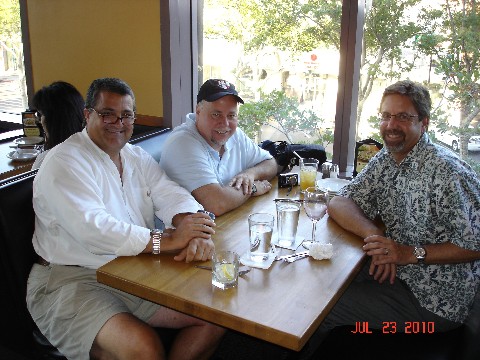 In 1990, I was invited by my cousin Bob to join members of the PCL SOM League, for their annual spring training trip to Phoenix to watch MLB games, play golf, and "observe" their annual SOM draft; my cousin hoping I would garner an interest in the league to joining them every year and dedicating the time to manage 2 teams in their league. Needless to say, I was hooked, and I renewed old friendships with my cousin Bob, his friends Ken, Eric, Steve, and Jim; and meet new friends in Pat and Gordon.
In 1990, I was invited by my cousin Bob to join members of the PCL SOM League, for their annual spring training trip to Phoenix to watch MLB games, play golf, and "observe" their annual SOM draft; my cousin hoping I would garner an interest in the league to joining them every year and dedicating the time to manage 2 teams in their league. Needless to say, I was hooked, and I renewed old friendships with my cousin Bob, his friends Ken, Eric, Steve, and Jim; and meet new friends in Pat and Gordon.
Eight of us were now complete in the Paradise Canyon League SOM baseball league, managing 2 teams each; one of my teams being grandfathered to me with Barry Bonds as its star player who earned 3 league MVP's (but no championships) over the course of his career in our PCL league. To this day, I have chosen to play SOM instead of remarry!!
Carl's SOM story: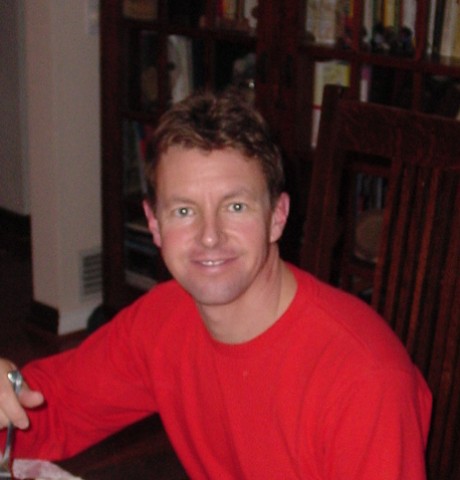
As managers, we quickly discovered the wisdom of calculating our players' on-base percentage and extra-base hits on offense and for pitching. This development of "data-driven performance" as boys in an area of passion became embedded and reinforced in the competitive environment of our SOM league among our friends.
Fast-forwarded to today, we middle-aged men have applied key statistical indicators into professional self-expression and contributing to our communities. For example, I'm a National Board Certified teacher of Social Science, and have been honored by two Los Angeles mayors as among the top few teachers in the city. A key aspect to this success that anyone sees walking into my classroom is the students' key statistics of performance on the front whiteboard: test and overall grades by class with GPA. In addition, after every major graded assignment, I take time for each student to come to my desk to see their statistics on my computer's grading program. From the same way I evaluated my SOM players' performance, I evaluate my students' performance. The added benefit today is that students' can use this statistical knowledge to perform extra work to earn the learning and grade of their choice, as well as seeing and feeling the devastating effect of a zero on an assignment (just like one of our players going zero for 10 at bats on batting average; an example I specifically use with my students).
For community contribution, I volunteered with a poverty-ending lobby group, RESULTS (www.results.org ) that was key to creating two UN Summits: the 1990 World Summit for Children (largest meeting of heads of state at the time), and the 1997 Microcredit Summit (topic of the 2006 Nobel Prize in Economics). The Executive Director of UNICEF credits our work with saving a million children's lives every year from increased funding for child survival programs. My central contribution to our lobby work was/is to frame policy in simple statistical cost-benefit analyses so legislators can easily translate money to benefits/lives' saved. The result was taking a SOM-learned skill and almost always getting legislative votes. This has also led to my being a leading writer for economic and political reforms, with my contribution to translate complex ideas into relatively easy statistical analysis. Yeah, this is quite similar to taking a baseball player's performance over a year and translating it onto one card that is quickly understood. This SOM skill extends to professional writing and being a lead-contributor to Advanced Placement Economics and Government teachers' lessons from sharing this to ~4,000 teachers on our listserve (see Economics of ending poverty: 0.7% of GNI is all it takes).
SOM: baseball, friendship, competition, and statistical application for fun, money, and a brighter future!
